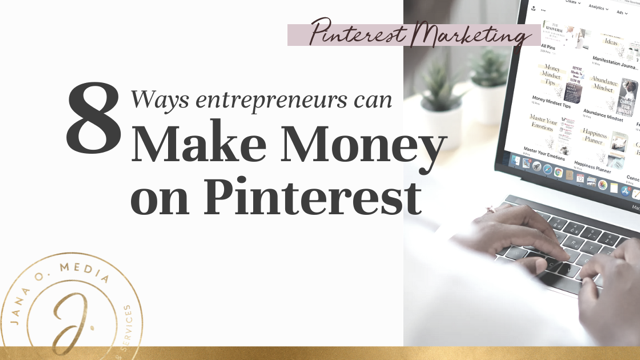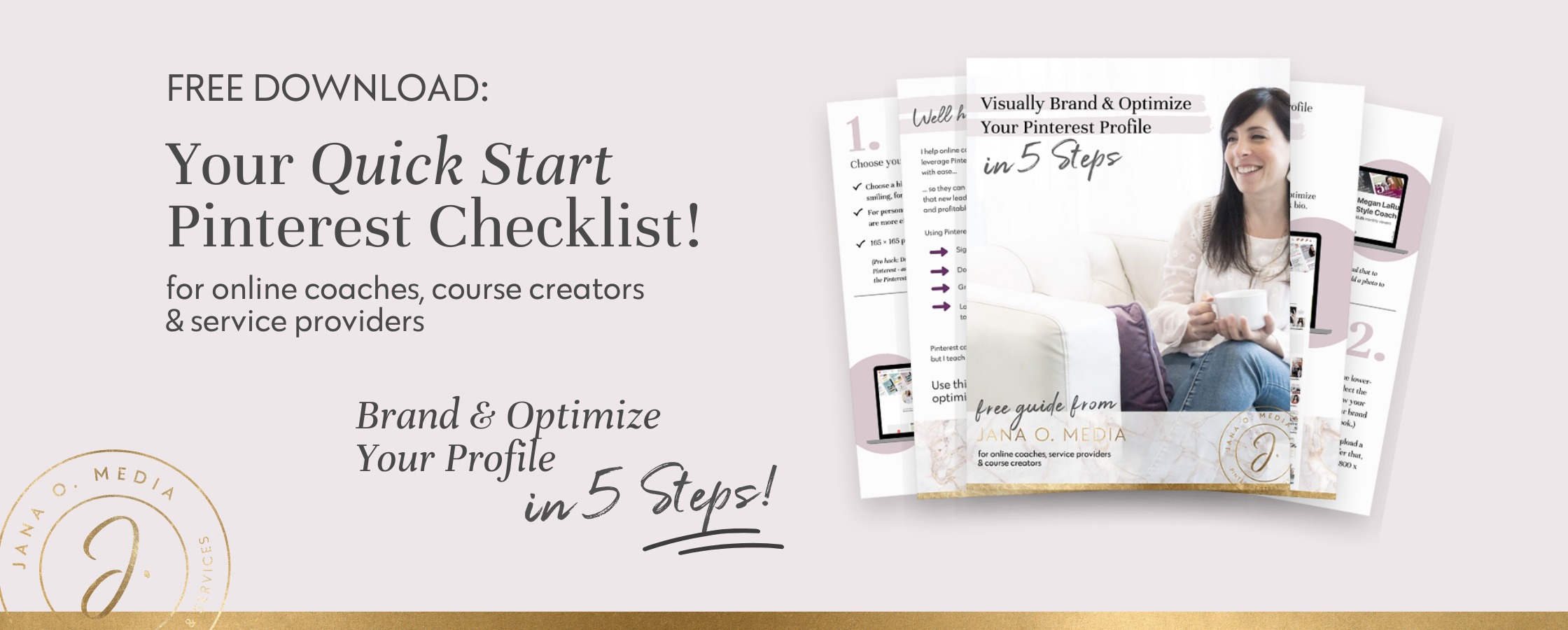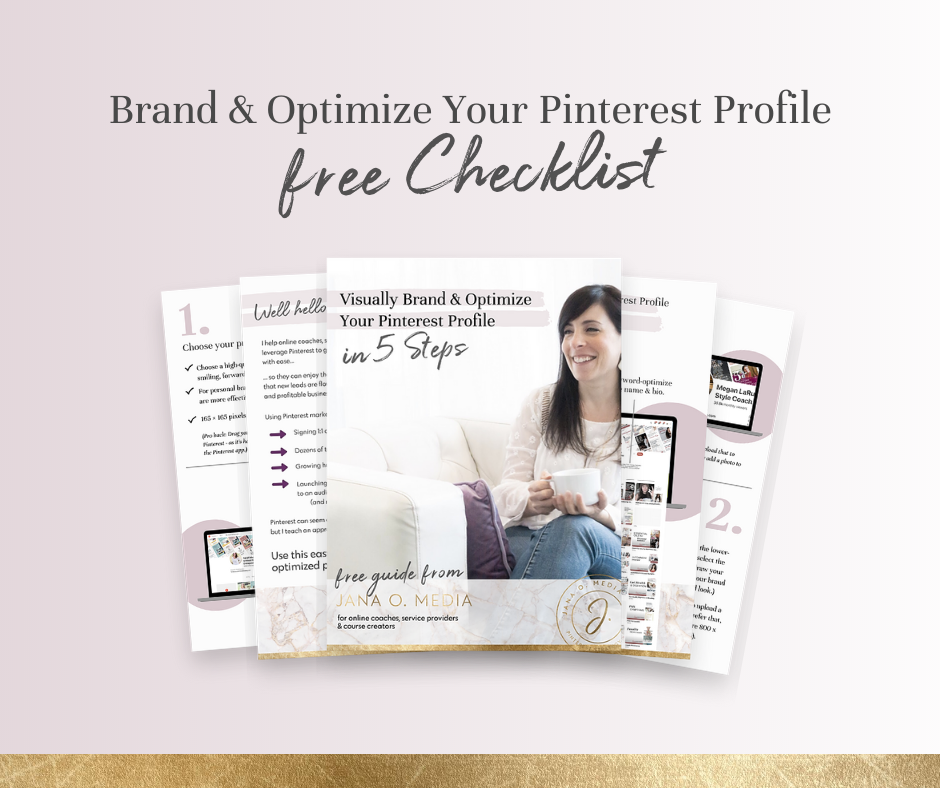Wondering how the pros actually make money on Pinterest?
Well, you’re not alone. In fact, I’ve been noticing lately a lot of entrepreneurs are about as CLEAR as MUD 😉on how people are actually monetizing their efforts on the platform.
So, in this post I’m going to lay it out for you!
Let’s look at eight specific ways that you can monetize your account, your Pinterest audience, and your pins.
Read them all – or click any of these links ⬇⬇⬇ to skip right to the methods you’re most curious about:
You can monetize by…
- Getting more eyes on your free content – and selling your services
- Growing your audience and selling digital products and courses
- Growing your email list with Pinterest – and selling from there
- Qualifying for and joining the Pinterest Creator Rewards program. (RETIRED!)
- Selling more of your affiliate offers using Pinterest
- Increasing your ad revenue by getting more blog traffic from Pinterest
- Selling physical products on and with Pinterest
- Landing brand partnerships as an influencer by leveraging your Pinterest platform
But first, let’s chat a little bit about how Pinterest works to do all of those things…
How to Make Money on Pinterest: The Basics
If you’ve mostly used Pinterest for personal searches up to now, you’ve probably thought about it as another social media network – like Facebook or Instagram.
But actually, Pinterest is more like Google than it is like social media! It’s actually a visual search engine.
Think about it: When you go to Pinterest, you’re probably not checking to see what your biz besties (or regular besties) have pinned lately.
What you’re doing instead is looking for ideas and inspiration. You might find a few things on your home feed. And you’ll likely head to the search bar and search for the ideas that you want (like maybe… Chore wheels for kids…? Self care morning routine ideas…? Low-carb dinner recipes…? or Yoga poses for beginners? #AlltheIdeas! 😉)
Then, you’ll look through the pins that pop up in your search results. Some will catch you attention. You might either pin them to a board to come back to later – or click over to the websites that they link to (or both).
As marketers, our goal is to show up in those search results – and lead people to take the next step with us.
Pinterest’s recent marketing campaign calls this “being their next great idea” – and I really love that way of describing it.
Before we move on, take a sec to press play on this quick video. 👇 You’ll gain some Pinterest audience insights – and it’s a super-fun reminder of how awesome the platform really is!
So fun, right? (You want to watch it more than once, dontcha? 😉)
Okay… so for most monetization methods we’ll cover, that next step we want people to take (after they discover us on Pinterest) is to get them to click over to our content. From there, we can capture a lead – and make a sale. (More on what it is we’re selling as Pinterest marketers below!)
To make money on Pinterest, we need the *right* people to find us – and our content and offers.
I shaOkay… so we know that to monetize on Pinterest, we must show up in relevant search results and then prompt users to take action.
So how do we get into the searches and smartfeeds of the right people on Pinterest?
We want to step right into the shoes (and minds!) of our customers and clients – and use keywords and keyword phrases that they are searching for. We use those keywords on our profiles, our boards, and our pins.
This is how we get in front of the *right* audience – people who are already searching for our things – our solutions, our content, our ideas…
From there, you’re able to nurture – and then make money on Pinterest (or using Pinterest) because your content is showing up to your potential clients/customers at the exact right time.
Alright, there’s one more point I want to make before we dive into ‘how to make money on Pinterest!’ (The 8 monetization strategies)…
(Pssssst…. You can 📌 pin this article for reference to your “Pinterest marketing” board!)
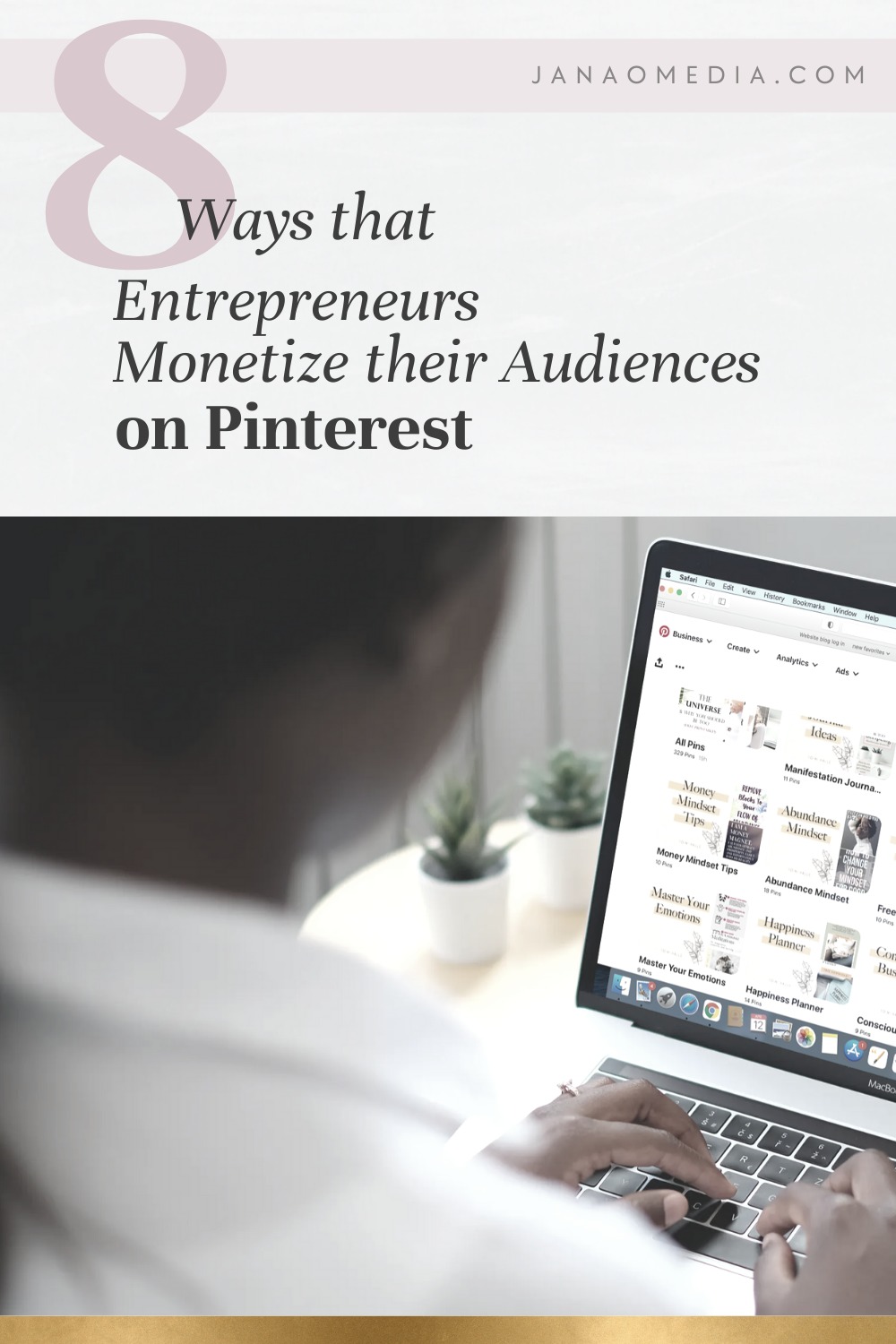
Does Pinterest pay you for monthly views?
Before we dive into the eight monetization strategies, I want to address a big ol’ 🐘 elephant in the room.
You may have landed on this blog post because you’ve heard rumors that having a (seemingly) significant number of “monthly views” on Pinterest is enough to get paid.
Or, you may simply believe that having a large “monthly views” number is a prerequisite for getting paid.
Either way, those are both myths that stubbornly stick around. So, here’s the REAL TALK:
No, Pinterest does not pay you for monthly views.
And no, there is no “minimum” number of monthly views that will somehow qualify you to get paid.
And yet, these myths remain very prevalent. Here are a few reasons why:
1) During 2021 to 2022, Pinterest did pilot an on-platform monetization program called “Creator Rewards.” It was very lucrative for some creators (I personally earned over $7,000 from the program) – and everyone wanted in. This program has since ended (effective November of 2022), but it actually *never* paid based on monthly views. But because many people hoped it would, rumors flew… and stayed around to this day.
2) Some sneaky people have created misleading content over the years (on Tiktok, Youtube, and other platforms) to try to convince creators (and budding creators) to join paid programs that claim to help you monetize on Pinterest. And one of the misleading messages they continue to perpetuate is that you can make money when you hit a certain number of monthly views on Pinterest. This is false. Moral of the story: Be very careful who you learn from.
3) Pinterest still parks this “monthly views” number front and center on our profile – and makes it public. So, it’s hard to ignore, and lot of people obsess over it. But the truth is, that number is actually not very meaninful for most of the monetization methods I’ll discuss in this blog.
Okay… stepping off my soapbox on that one, now. Let’s move on, shall we? 😉 )
Because it’s time to deliver the goods… 8 ways to make money on Pinterest…
1. Get more eyes on your free content & sell your services.
If you’re a coach, consultant, or done-for-you service provider, then this one’s for you!
You might not have thought of Pinterest as a way to promote your services or coaching before – but this is actually how I help my clients. (I specialize in working with online coaches and service-based businesses in my own Pinterest marketing practice.)
Yes, Pinterest can be a highly effective (and low maintenance) way to attract perfect-fit clients. Just know that you need to have a bit of strategy behind it.
One of the best ways to do this is by promoting your free and valuable content. This could be your…
- Blog posts
- Podcast episodes and show notes
- YouTube videos
- Instagram or other social posts
…or any other sort of free, awesome content that you’re already creating as a part of your marketing strategy. (Get creative – one of my past clients publishes a new guided meditation each week on her website. It’s free – and it’s content that serves to attract people to her site.)
On Pinterest, you create pins that link back to your free content. Then, when someone is searching for the kind of content that you pinned, your blog post/podcast episode/YouTube video will pop up at the exact right moment that they need it! ⇐== Pretty powerful, right?
From there, they’ll click over to your content and read your blog post / listen to your podcast episode / watch your YouTube video… and totally fall in love with you (because I know you’re the kind of person people fall in love with 😍).
Here are a few of the things that could happen from here: (non-exhaustive list here!)
- They’ll continue to consume your valuable free content until they’re ready to hire you.
- They’ll sign up for your email list where you can continue to serve and nurture them, as well as sell your offers (more on this in the email list section!).
- From your email list, you can invite them to a discovery call, to your social channels or groups… or to the spot where you do your best sales and conversion work.
- They’ll hire you the moment they find you.*
(*Psssst… this last one does happen, but let’s not count on it… Let’s set up some systems to capture them as a lead and continue the conversation. 😉)
No matter what “customer journey path” you’ve laid out, the idea is to serve them with really excellent, helpful content that speaks to what they’re searching for on Pinterest.
Remember… Your content should also position you as an expert. And it should help your audience learn and understand things that will highlight the “gap” between where they are now – and where they could be if they hire you to help them.
From there, you can sell your services in whatever way works best for you!
**Pro Tip: There are many types of content that do extremely well on Pinterest for promoting your services. Here are a few…
- How tos (e.g. How to Naturally Balance Your Hormones)
- Case studies (e.g. How Jeannie Balanced Her Hormones in 3 Months)
- Guides to hiring the type of service provider you are (e.g. “How to Find an Amazing Hormone Health Coach”)
And what if you’re not a coach or a service provider? Not to worry, there are plenty of other methods to make money on Pinterest! … Up next: I’m talking about selling digital products and courses… (Keep reading! It’s a juicy one!)
(And if you *are* monetizing with services – like done for you offers, coaching, or consulting – you’ll definitely want to grab my free Pinterest Quick-Start Checklist. It walks you through five steps for setting up your Pinterest profile to attract and land dream clients… You’re welcome!)
2. Grow your audience & sell digital products – like online courses.
If you’re more of a digital product or course course creator than a service provider, there’s room for you on Pinterest too!
People have always gone to Pinterest searching for ideas, inspiration, and solutions to their problems – and your digital products and courses surely solve problems that people on Pinterest are searching for.
Similar to marketing services on Pinterest, you can link to all of the amazing free, helpful content that you have (whether it’s blog posts, podcasts, YouTube videos,or something else) and grow your audience from there.
You can promote your products and courses within your free content, promote your email freebies to grow your email list, or even link directly to less expensive products – and sell from Pinterest directly.
Growing your email list using Pinterest is an especially helpful way to sell your digital products and courses – because having an email list packed with action-takers makes EVERYTHING easier when it comes to selling digital products on scale. So let’s talk about that next.
3. Promote your lead magnet & grow your email list using Pinterest.
As we’ve already talked a bit about in the previous two sections on how to sell your services, products, and courses on Pinterest, growing your email list can be a key part of your strategy.
… Which basically means we want to promote (or SELL the benefits of!) your lead magnet!
When people first find you on Pinterest, they might not be ready to buy immediately. This is because Pinterest traffic is what I like to call “warm-cold traffic.”
People who find you on Pinterest are warm – in the sense that they are *already looking* for your content – and about what you help with, teach about, and offer.
But they are also a cold audience in the fact that they don’t typically know who you are (yet!). (This is actually a really good thing… We want to bring new people into our audiences all the time, priming your pipeline of customers or clients.)
So you need to have a way to capture their interest and continue to nurture them. And your email list is really the PERFECT way to do juuuuuuuust that. 🤓
By getting people who find you on Pinterest to join your email list, you can keep in touch with the person that is interested in what you have to offer – and continue the conversation. Then, because you’ve nurtured them on your email list, some of them will be ready to buy- when it comes time to sell your next offer.
Plus, growing your email list with people who are aligned with your ideal clients is always going to be great for any offer that you want to sell on Pinterest, because you can always sell to your email list.
Growing your email list with Pinterest generally works like this:
Step 1: You create a high-value freebie (like a checklist, masterclass, or ebook, for example). People give you their email – and permission to mail them – in order to receive this value.
Step 2: You promote that freebie in blog posts (or podcast eps, videos, etc) that you link to from Pinterest. You can also pin pins directly to the freebie’s opt-in landing page.
Step 3: People find you on Pinterest – when they are searching for the solution that your lead magnet offers. They enter their email, get access to your helpful freebie, and become a part of your email list.
Step 4: You nurture your email list with valuable emails that aim to grow your “like, know, and trust” with these prospects – so that they’re ready to buy when you send out a sales email!
Got it? Picking up what I’m putting down here? 😉 Cool.
Okay, but what if you don’t have a digital product or service of your own to sell? Let’s talk about other options for how to sell on Pinterest.
4. Qualify for and join the Pinterest Creator Rewards program.
NOTE: The Creator Rewards program beta was ended effective 11/29/2022. Pinterest wrote: “We made this decision so that we can focus on features that make it easy for more Creators across the world to earn money on Pinterest – things like product tagging, affiliate links and paid partnerships.”
At the time of writing this, the Creator Rewards was a program is in beta. It was a way for creators to earn money for creating original Idea Pins in response to monthly reward goals created by Pinterest.
I was in the program – and it was great while it was a thing! Here’s a screenshot below of what my dashboard currently looks like.
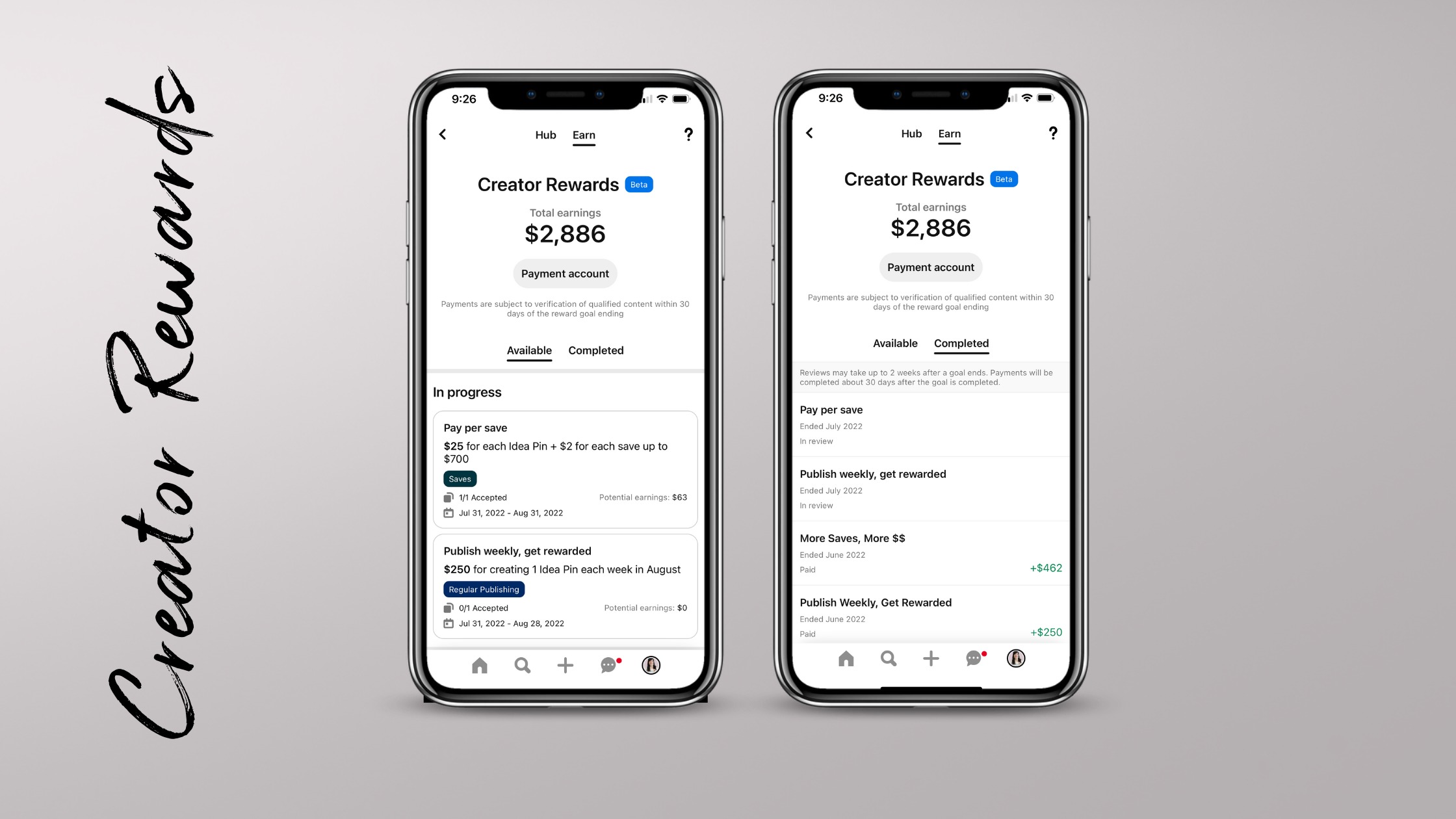
*Keep in mind, the Creator Rewards program is NOT THE SAME as the Creator Fund program.
The Creator Fund continues, and it is technically an entirely separate way that select creators can monetize on Pinterest.
It opens four times per year, and Pinterest announces when it does. It’s a 5-week accelerator program in which the selected creators get a $25,000 grant (cash, equipment stipend, ads), specialized training, and access to brand partnership deals.
5. Sell affiliate offers on Pinterest – and make more affiliate marketing revenue.
There’s an entire breed of entrepreneurs that use Pinterest as a way to sell more of their affiliate offers.
(BTW, affiliate marketing is when you promote another person or company’s products or services – and they reward you for each visitor or customer brought by your marketing efforts. You can serve as an affiliate for products – or for things like software you use in your business, for example. If you want to learn about affiliate marketing basics, I suggest this great podcast episode that Amy Porterfield did with Pat Flynn.)
Strategies for selling affiliate offers with Pinterest essentially fall into three categories:
- You can link to and grow traffic to blog posts (and content) with affiliate links in them.
- You can link directly to affiliate products from Pinterest.
- You can add links from *some* affiliate programs – right to your Idea pins!
*At the time I’m writing this, Amazon, Rakuten and ShopStyle are the three programs that are live. Pinterest says more are coming!
The second strategy can work really well, but comes with a few caveats. So here are a few things to note when linking directly to affiliate products:
- Be sure to add a disclaimer in your pin description that complies with FCC regulations.
- Double-check that affiliate links on Pinterest are allowed for each specific affiliate program. Affiliate links, in general, are allowed – according to Pinterest terms and conditions, but some affiliate programs (like Etsy for example) do not allow you to use your affiliate links on Pinterest. So it’s important to do your homework – and to make sure you’re following the rules.
6. Increase your ad revenue by getting more blog traffic from Pinterest.
The blogging community has been “Pinterest marketing savvy” for as long as the platform has been around – and we can learn a lot from them, regardless of how we monetize. 🙂
I always say that there’s a huuuuuuge difference between blogging FOR your business… versus blogging AS a business. If you’re a blogger and you’re interested in getting more traffic to your blog – so you can monetize via ads, you likely fall into the second bucket. (You’re blogging AS a business.)
By creating Pins that link back to your blog posts, people who are searching for those posts can find them and easily land on your blog. This drives up your traffic.
With a healthy amount of traffic on your blog, you can apply to be part of an advertising network like Mediavine or Ezoic. Then you can get paid when people see the ads you’re hosting on your blog.
With this monetization method, the more traffic that you get from Pinterest (and from other traffic sources like Google), the more money that you’ll make from ads, so it’s a win-win!
7. Sell e-commerce/physical products on Pinterest.
Pinterest is a fantastic marketing channel for physical products and ecommerce stores as well.
Why? Well, let’s start with the fact that 89% of Pinterest users are on the platform for purchase inspiration. Not only that, but 97% of searches on Pinterest aren’t brand related, meaning that you have the chance to catch people’s attention even as a small brand.
By pinning your products on Pinterest, you can capture people’s interest and make sales of your physical products straight from the platform.
(If you want to sell more of your physical products using Pinterest, I have a great resource for you to learn how! Please feel free to send me an email or a DM. Let me know you want my recommendation for e-commerce shops who want to learn and grow Pinterest… and I’ll hook you up!)
8. Land brand partnerships using your Pinterest presence.
If you’re an influencer or content creator, you shouldn’t overlook Pinterest as a platform to be on (Yes, even if you don’t have a blog!).
By growing your presence on Pinterest, you can use your reach on the platform as an element of your pitch – when working with brands.
While this isn’t the monetization method that I personally specialize in, I’ve heard some incredible stories of women getting discovered by brands – and becoming brand ambassadors or landing lucrative brand deals – because of Pinterest…
- A wellness coach approached by a well-known blender brand (rhymes with Bita-fix! 😉) – because she pins luscious smoothie recipes
- A mommy blogger offered a brand partnership with a diaper bag company – because of her Pinterest boards for newborn moms
- A tech virtual assistant approached by a CRM software to help grow their reach – because she was pinning about tech tips
- A travel writer offered free hotel stays – in exchange for pinning her own hotel photos and honest reviews to her “Things to Do in Miami” board
The role of the “micro-influencer” is growing in just about every niche, and Pinterest marketers are here for it!
Final thoughts on how to make money on Pinterest…
No matter who you are or what you sell, Pinterest can be an incredibly effective tool for growing your audience – and your income.
As a quick summary, here are all of the ways (that this post covered anyway!) that you can make money on Pinterest:
- Grow traffic to your free content – to sell your products or services
- Promote your lead magnets to grow your email list
- Earn money by creating pins through the Pinterest Creator Rewards program
- Sell affiliate offers on Pinterest (and with Pinterest!)
- Get more blog traffic – and grow your blog’s ad revenue
- Sell your physical products – using or directly on Pinterest
- Land brand partnerships as an influencer – leveraging your Pin-presence
And that’s it! That’s my (fairly!) complete guide to how to make money on Pinterest. I am certain it’s not an exhaustive list, but it covers the basics.
I hope it was eye-opening and motivating for you.
And, remember, if you are ready to get started with *your* Pinterest marketing strategy, you can grab a copy of my FREE Pinterest QuickStart Checklist. Add your name and a good email, and I’ll send it right over!

